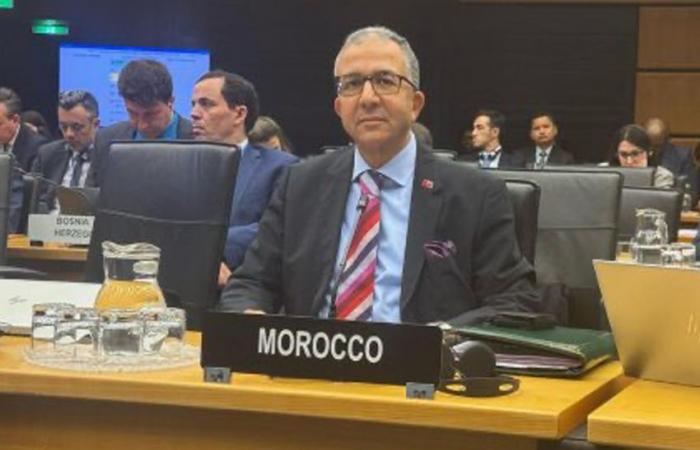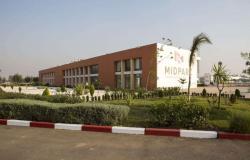
International cooperation remains essential for the “sure, effective and viable” exploitation of the extraatmospheric space, the ambassador permanent from Morocco on Monday in Vienna on the United Nations and international organizations in Vienna, Azzeddine Farhane on Monday.
In a speech during the 64th session of the legal subcommittee of the Committee of Pacific Use of the Extraatmospheric Espace of United Nations, Mr. Farhane reiterated Morocco’s commitment to all initiatives aimed at promoting international cooperation and promoting responsible use of extra-atmospheric space for the benefit of all humanity.
The diplomat underlined that Morocco remains attached to the principles of the 1967 Treaty, guaranteeing a fair and rational use of extra-atmospheric space, non-use and non-militarization, including the moon and celestial bodies. Morocco considers that the peaceful use of extra-atmospheric space “is essential to the long-term viability of space activities,” he said, expressing the kingdom’s commitment to responsible and sustainable space activities. “In this regard, Morocco welcomes the hard work of the COPUOS (Committee for peaceful use of extra-Atmospheric space) and its two sub-comities, in particular the legal sub-comity, to preserve the viability of space activities thanks to the development of guidelines for long-term viability of space activities,” said Farhane, stressing that these guidelines constitute “an important legal instrument United Nations for the Governance of International Space Activities, which involve new actors more than ever and raise complex questions. ”
The ambassador, on the other hand, recalled that in the context of its commitment to global spatial governance, Morocco has registered several space objects, including the Mohammed VI-A and Mohammed VI-B satellites launched in 2017 and 2018, as well as the UM5EO and UM5 Ribat nanosatellites launched in 2024, within the framework of its space research program.
As such, he pointed out that small satellites represent a technological development providing significant advantages in terms of exploration and exploitation of extra-Atmospheric space, especially for developing countries. In the same context and in accordance with its international commitments, Morocco has appointed the royal remote sensing center as a focal point for the registration of Moroccan spatial objects, in accordance with the rules and procedures of the United Nations Spatial Affairs Office, added Mr. Farhane, stressing that these measures are of crucial importance to guarantee the traceability of spatial objects and ensure their compliance with international law, safe governance and space responsible.
“This achievement as well as the initiatives of Morocco through its strategic development plans very clearly illustrate that our country has made spatial technological tools a real asset and a strategic lever in the context of the socio-economic development of our country,” said the ambassador. And to underline that Morocco considers that the strengthening of the legal component of the exploitation, exploration and use of space, through reinforced international cooperation and collaboration, “is essential to promote the sustainable development of space activities”.
In this context, he recalled that Morocco has contributed to the various working groups of the subcommittee, in particular those relating to the exploitation and use of space resources, the legal aspects of traffic management and the application of international law to the activities of small satellites. Farhane, on the other hand, has noted that at the regional level, cooperation with African countries constitutes a fundamental pillar of the Moroccan national strategy for the development of space activities. In this regard, he recalled Morocco was elected member of the Council of the African Space Agency, during the 44th ordinary session of the Executive Council of the African Union in February 2024. As part of this regional approach, Morocco undertakes to promote the understanding of law and space policy in the regional African Center for Spatial Sciences and Technologies (Craste-LF) whose seat is in Rabat, and to support these efforts continuously.
And to add that Morocco, as part of its participation in all the activities initiated at the African level, the CSSTE-LF has played a decisive role in strengthening capacities thanks to its master’s degree in space sciences and technologies since 2000. In 2024, this master welcomed 89 students from 10 French-speaking countries, he said, stressing that this continuous commitment highlights the commitment of Spatial capacities in Africa. In the same vein, the diplomat noted that the CSSTE-LF also developed an online training platform, making its educational resources accessible to all African countries, and is currently collaborating with the regional centers network and UNOOSA to refine its third cycle program, thus improving access to quality space education in Africa.
“Morocco remains convinced that the multiplication and organization of events focused on jurisdiction and spatial policies for the benefit of all countries, in particular African, are essential to promote the membership of states to the five treaties governing extra-atmospheric space and for the establishment of a full national spatial right,” said Farhane, before concluding that Morocco, which will preside the COPU His firm determination to support the smooth running of this session, “guided by the spirit of the consensus of Vienna which has always prevailed during our work”.







